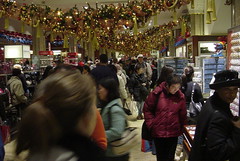A Chicagoist Black Friday Primer
By Chris Karr in Miscellaneous on Nov 27, 2006 1:50PM
For some morbid reason, we really dig Black Friday.
We don't know if it's reading about all the fighting that happens online when deal Web sites begin to publish stores' Black Friday specials, or if we're simply amazed at the sheer crush of people who hit the sidewalk that Friday off from work. Black Friday seems to be a uniquely American phenomenon, and there's really no better place to witness it than here in Chicago.
 For those unfamiliar with the term, Black Friday is called "black" because it's supposedly the day when most shoppers come out and push the stores' accounting from the money-losing "red" to the profitable "black." While Black Friday witnesses the greatest number of shoppers out and about, the day where the most money is spent tends to be the Saturday before Christmas. "How does this happen?" you might ask. It's relatively simple.
For those unfamiliar with the term, Black Friday is called "black" because it's supposedly the day when most shoppers come out and push the stores' accounting from the money-losing "red" to the profitable "black." While Black Friday witnesses the greatest number of shoppers out and about, the day where the most money is spent tends to be the Saturday before Christmas. "How does this happen?" you might ask. It's relatively simple.
In order to maximize the customers entering their doors, stores like to hold Black Friday sales. The idea is that they offer some really good deals on DVDs, a plasma TV, or other items at a loss to the store. Shoppers come in to purchase the deals and end up picking up some other items that have not been as deeply discounted, making up the difference. The problem with this theory is that relies heavily upon impulse purchasing. In years past, stores only revealed their sales at the last minute, in order to catch buyers off guard so that impulse purchasing is more likely. You only went into Best Buy to pick up a few discounted DVDs, but now that you're here, you might as well pick up that plasma TV for gramps.
Something about this strategy must have worked, else it would not be as popular as it is. However, with the aid of the Internet, shoppers have been getting savvier. Employees at these stores have been known to leak scans of Black Friday newspaper advertisements, much to the chagrin of retailers. Shoppers could go online to see which stores were offering which deals and plan their shopping accordingly. You could get your cheap DVDs at the first store, then hop in the car to pick up gramps' HDTV at the next store. You'd get off good because the retailers' marketing departments essentially subsidized your purchases. And they get shafted because they're only selling the loss leaders and the low-margin items. You save money while they lose it. And in the grand American tradition, people go to court every year over this.
So, how did Black Friday turn out this year? We stayed off the street for most of the day, but we did sneak into a few stores in the evening. They were still plenty busy, but the stores didn't look like war zones as they did in years past. We were looking for smaller-ticket items like books and DVDs, and while the deals were respectable, they were not amazing. We ended up buying some books and five-dollar DVDs, and we were happy with our purchases. From the stores' perspectives, shoppers were spending more this year ($360 per shopper vs. $302 per shopper last year) but they were mostly buying the promotional items. The Sun-Times has the full story.
We're a bit disappointed that we don't have any juicy Black Friday stories to tell (like the one about the mothers beating each other silly to get the last Tickle-Me-Elmos). Things were relatively chill from our perspective. Were our observations pretty standard, or did any of you witness any special craziness this year? Or were you just waiting for Cyber Monday?
Image credit: LarimdaME